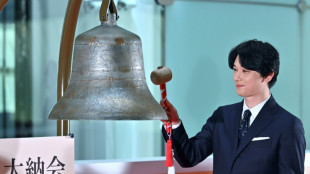
-
 S. Korea investigators get new warrant to arrest President Yoon
S. Korea investigators get new warrant to arrest President Yoon
-
Tottenham trigger Son contract extension

-
 China's most successful team kicked out of professional football
China's most successful team kicked out of professional football
-
Eyeing green legacy, Biden declares new national monuments

-
 South Korea rival parties form plane crash task force
South Korea rival parties form plane crash task force
-
Georgians hold anti-government protest on Orthodox Christmas

-
 Japan actor fired from beer ad after drunken escapade
Japan actor fired from beer ad after drunken escapade
-
Nvidia ramps up AI tech for games, robots and autos

-
 Blinken says US-Japan ties solid despite rift over steel deal
Blinken says US-Japan ties solid despite rift over steel deal
-
Quake in China's Tibet kills 95 with tremors felt in Nepal, India

-
 Taiwan says Chinese-owned ship suspected of damaging sea cable goes dark
Taiwan says Chinese-owned ship suspected of damaging sea cable goes dark
-
North Korea's Kim says new hypersonic missile will deter 'rivals'

-
 Sinner turns focus to Australian Open defence after 'amazing' year
Sinner turns focus to Australian Open defence after 'amazing' year
-
Ostapenko begins Adelaide title defence with comeback win

-
 Asian markets mostly up after tech-fuelled Wall St rally
Asian markets mostly up after tech-fuelled Wall St rally
-
Pace of German emissions cuts slows in 2024: study

-
 McDonald's rolls back some of its diversity practices
McDonald's rolls back some of its diversity practices
-
Giannis triple-double propels Bucks over Raptors

-
 S. Korea rival parties form plane crash task force despite political turmoil
S. Korea rival parties form plane crash task force despite political turmoil
-
Quake in China's Tibet kills 53 with tremors felt in Nepal, India

-
 Olmo situation overshadowing Barca bid for Spanish Super Cup
Olmo situation overshadowing Barca bid for Spanish Super Cup
-
Winter storm leaves large US region blanketed in snow, ice

-
 Hewitt's son Cruz out of Australian Open qualifying at first hurdle
Hewitt's son Cruz out of Australian Open qualifying at first hurdle
-
Quake in China's Tibet kills 32 with tremors felt in Nepal, India

-
 Blinken says US-Japan ties rock solid despite rift over steel deal
Blinken says US-Japan ties rock solid despite rift over steel deal
-
Osaka splits with rapper Cordae ahead of Australian Open

-
 Sabalenka to Andreeva: Five women to watch at the Australian Open
Sabalenka to Andreeva: Five women to watch at the Australian Open
-
Sabalenka eyes Australian Open hat-trick but Swiatek, Gauff lurk

-
 Asian markets mostly rise after tech-fuelled Wall St rally
Asian markets mostly rise after tech-fuelled Wall St rally
-
Blinken in Japan after rift on steel deal

-
 Ex-England skipper Vaughan backs shake-up 'to keep Test cricket relevant'
Ex-England skipper Vaughan backs shake-up 'to keep Test cricket relevant'
-
S. Korea investigators seek new warrant to arrest President Yoon

-
 North Korea's Kim says new missile will deter 'rivals'
North Korea's Kim says new missile will deter 'rivals'
-
France to remember Charlie Hebdo attacks 10 years on

-
 'Comeback' queen Demi Moore 'has always been here,' says director
'Comeback' queen Demi Moore 'has always been here,' says director
-
Homes talk and tables walk at AI dominated CES

-
 Kyrgios set for Davis Cup return after five years
Kyrgios set for Davis Cup return after five years
-
Golden Globes ratings edge up past 10 million

-
 USA striker Vazquez joins Austin in club record deal
USA striker Vazquez joins Austin in club record deal
-
Argo Blockchain PLC Announces December Operational Update

-
 Kuros Biosciences USA, Inc. Announces an Exclusive Strategic Agreement with the Medtronic Spinal Division
Kuros Biosciences USA, Inc. Announces an Exclusive Strategic Agreement with the Medtronic Spinal Division
-
Meta Names UFC boss Dana White, a Trump ally, to board

-
 Tensions mount in Venezuela ahead of Maduro swearing-in
Tensions mount in Venezuela ahead of Maduro swearing-in
-
Judge rejects Trump request to delay hush money sentencing

-
 US, European markets mostly rise as Trump tariff plans in question
US, European markets mostly rise as Trump tariff plans in question
-
Forest tame Wolves to maintain unlikely Premier League title challenge

-
 Mavs' Irving out with back sprain, could reportedly miss two weeks
Mavs' Irving out with back sprain, could reportedly miss two weeks
-
Venezuela on tenterhooks ahead of Maduro swearing-in

-
 Scheffler to skip La Quinta as hand heals
Scheffler to skip La Quinta as hand heals
-
Late Abraham winner gives Milan Italian SuperCup win over Inter


'Not based on science': US confronts abortion 'reversal' myths
Wracked by guilt after taking an abortion pill, a sobbing woman calls a US hotline. It recommends a "reversal" treatment to save the fetus -- despite medical warnings that it is potentially life-threatening.
Misinformation about medical termination appears to have skyrocketed since last June, when the Supreme Court overturned the landmark 1973 Roe v. Wade decision that guaranteed a constitutional right to abortion.
That includes false "pro-life" posts on social media claiming abortion pills cause cancer and infertility -- as well as "pro-choice" content promoting dubious herbal treatments to terminate a pregnancy.
More striking, researchers say, is a wave of misleading content that promotes an unscientific treatment that promises to undo the effects of the first pill, mifepristone, in the two-drug regimen for medical abortion.
Anti-abortion advocates in the United States have heralded the so-called "reversal" treatment -- which involves taking the hormone progesterone -- for women who change their minds after taking mifepristone.
"Abortion pill reversal can help turn back the clock," reads the website for the Abortion Pill Rescue Network (APRN), a pro-life outfit that supports the treatment.
"When destructive voices would only say 'it is done,' abortion pill reversal says 'here is a second chance at life, just in time.'"
APRN's website lists anecdotal "success stories" -- emotional testimonies from women who opted for the treatment. Some, including a single mother identified as Shashana, broke down after taking the first pill, consumed with regret.
She reached out to APRN's hotline that got her started on the "reversal" procedure that her written testimony says saved her fetus.
What is not mentioned is the warning from the American College of Obstetrics and Gynecologists (ACOG), an association of reproductive health specialists, that calls the treatment "unproven," "unethical" and "not based on science."
Also omitted is a 2019 medical trial by researchers from the University of California, Davis, to test the effectiveness of the "reversal" treatment. The trial had to be stopped prematurely after some participants experienced severe internal bleeding.
- 'Potential to harm' -
"The anecdotal 'success stories' often fail to acknowledge that there is no reputable medical evidence that taking progesterone to reverse the effects of mifepristone increases the likelihood of a pregnancy continuing," Anicka Slachta, a senior analyst at the watchdog NewsGuard, told AFP.
"Ultimately, omitting that context and presenting abortion pill 'reversal' as definitively safe and effective has the potential to cause harm."
When AFP requested APRN provide supporting data and interviews with the women cited under the "success stories," a publicist for Heartbeat International, an anti-abortion group that backs the network, replied.
She inquired what AFP's article intended to highlight but stopped responding thereafter.
When a US health misinformation researcher reached APRN's hotline posing as a pregnant woman, she was told the network had successfully saved 4,000 babies through the "reversal" treatment.
The hotline operator did not reveal the number of unsuccessful cases but mentioned a success rate of 64-68 percent, a statistic also cited on the network's website.
When the researcher -- who shared the audio recording with AFP -- pointed out that ACOG did not consider the treatment as safe, the operator dismissed the organization as "very pro-abortion," a stance that makes them "biased."
The operator said a prayer that she "make the right decision" -– that is, not carry out the abortion.
- 'Bodily autonomy' -
"What was clear in the call is that this group cares more about the life of the baby than the mother, point blank," the researcher told AFP, requesting anonymity for fear of online harassment.
"That was evident in the way they referred to the fetus but also through the omission of any real data about the risks."
In a report last week, the Center for Countering Digital Hate (CCDH) said thousands of "fake clinics" across the United States -- which seek to prevent "abortion-determined" people from accessing care -- collectively spent $10.2 million on Google search ads over the past two years.
Many of them, it said, promoted the "potentially dangerous" reversal procedure.
Research by the technology nonprofit Meedan Digital Health Lab shows that in the months after Roe v. Wade was overturned, online conversations about pill "reversals" were among three topics associated with abortion misinformation that saw a dramatic surge.
"It's not the idea of someone changing their mind on their own about having an abortion that's dangerous," Jenna Sherman, a program manager at the nonprofit, told AFP.
"It's pushing an unverified and potentially life-threatening intervention in an effort to be anti-abortion first and foremost over everything, rather than support people's bodily autonomy."
A.Jones--AMWN



